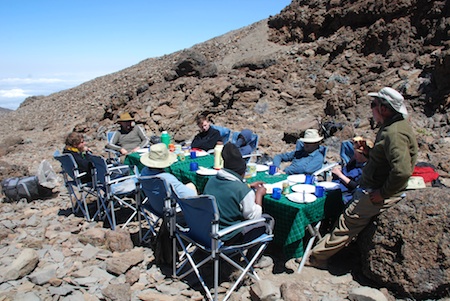Introduction
Mount Kilimanjaro is a challenging and exhilarating adventure that attracts thrill-seekers and nature enthusiasts from around the world. Standing at an impressive 5,895 meters, it is the highest peak in Africa and one of the Seven Summits. Scaling this majestic mountain requires physical fitness and mental strength, and diet plays a crucial role in preparing your body for the arduous journey ahead. In this article, we will explore the best diet to follow while on Mount Kilimanjaro to ensure that you have the energy and stamina to conquer this extraordinary feat.
Understanding the Challenges
Before discussing the best diet for climbing Mount Kilimanjaro, it is essential to understand the challenges you will face during the ascent. The terrain is steep and rugged, and the altitude can cause various symptoms such as nausea, fatigue, and loss of appetite. Therefore, it is important to fuel your body adequately to combat these challenges and maintain your physical and mental well-being throughout the climb.
Caloric Needs
When climbing Mount Kilimanjaro, your body will require significantly more calories than usual due to the intense physical activity and the high altitude conditions. On average, climbers burn between 4,000 to 6,000 calories per day while on the mountain. To meet these caloric needs, your diet should consist of nutrient-dense foods that provide a good balance of carbohydrates, proteins, and fats.
The Best Diet While on Mount Kilimanjaro
1. Carbohydrates: As the primary source of energy, carbohydrates should form a significant portion of your diet. Opt for complex carbohydrates like whole grains, legumes, fruits, and vegetables. These foods provide sustained energy and release glucose slowly into the bloodstream, preventing sudden spikes and crashes in blood sugar levels.
2. Proteins: Protein is necessary for muscle repair and recovery. Include lean sources of protein such as chicken, fish, tofu, and beans in your meals. These foods will help you recover faster and maintain muscle strength during the climb.
3. Healthy Fats: While fats are a concentrated source of calories, they are essential for energy production, insulation, and protection of vital organs. Choose healthy fats like avocados, nuts, seeds, and olive oil. Avoid consuming excessive amounts of saturated and trans fats, as they can contribute to fatigue and sluggishness.
4. Hydration: Staying hydrated is crucial for maintaining physical performance and combating altitude sickness symptoms. Drink plenty of water throughout the day, aiming for at least 3-4 liters. Additionally, include electrolyte-rich beverages like sports drinks or oral rehydration solutions to replenish essential minerals lost through sweating.
5. Snacks: Packing nutrient-dense snacks is essential for maintaining energy levels during the climb. Opt for lightweight, non-perishable snacks such as nuts, granola bars, dried fruits, and energy gels. These snacks provide a quick boost of energy and are easy to consume on-the-go.
Tips for Meal Planning
1. Prioritize Nutrient-Dense Foods: Focus on including whole, unprocessed foods in your meals to maximize your nutrient intake. Choose fresh fruits, vegetables, and whole grains over processed snacks and junk foods.
2. Opt for Light and Portable Foods: Since you’ll be carrying your own supplies, choose lightweight and easy-to-pack foods. Look for dehydrated or freeze-dried meals that can be rehydrated with boiling water. These are not only convenient but also help reduce the weight of your backpack.
3. Consider Local Cuisine: Take advantage of the local Tanzanian cuisine, which typically includes healthy options such as beans, lentils, and grilled meats. Embrace the local flavors to add variety and nutritional value to your meals.
4. Listen to Your Body: Pay attention to your body’s hunger and fullness cues. Eat when you feel hungry and stop eating when you feel satiated. Avoid overeating or undereating, as both can negatively impact your performance and well-being on the mountain.
5. Consult with a Professional: If you have specific dietary requirements or concerns, it is recommended to consult with a registered dietitian or a healthcare professional who specializes in mountaineering nutrition. They can provide personalized guidance based on your individual needs.
Conclusion
The best diet while on Mount Kilimanjaro is one that focuses on providing sufficient calories, nutrients, and hydration to sustain your physical and mental well-being throughout the climb. Prioritize complex carbohydrates, lean proteins, and healthy fats, and stay hydrated with plenty of water and electrolyte-rich beverages. With the right fuel, you’ll be well-prepared to conquer the challenges of Mount Kilimanjaro and create unforgettable memories of this incredible adventure.







